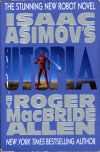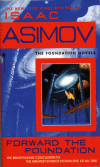About five years has passed since the New Law robots were put to work at Purgatory to assist with the terraforming effort for Inferno. Alvar Kresh won the election for governor and ended up choosing a dual terraforming system combining a positronics with a super computer. In an unexpected turn, Kresh ended up marrying Fredda Leving. Initially I thought that they made a rather odd couple, but I think Allen did a good job of handling their relationship throughout this book. The main plot Utopia revolves around a plan by a scientist to harness a comet and blow it apart to dig a huge channel from the southern ocean to the frozen northern ice cap which would otherwise be impossible by conventional means.
The argument for this drastic measure is that the existing terraforming effort will fail much sooner than expected. In just a few years the surface of the planet might not be habitable. That probably wouldn’t be a problem for Settlers since they prefer their underground buildings, but for Spacers it would pose a serious problem. The comet plan might sound plausible given the combined efforts of the Spacers and Settlers, but there are many that don’t want this to happen. Many fear that something will go wrong and the planet will be destroyed. Also, how will robots allow such a task to take place given the nature of the Three Laws? Will robots allow a comet to hit the planet? Allen answers this in unexpected, yet plausible ways which I’ll leave you to uncover.
One thing that I didn’t notice until this book in the series was that Allen had not really addressed the fundamental differences between Spacers and Settlers. In chapter 4 he explains that Spacers age much more slowly than Settlers. There were no precautions such as nose plugs or aversions to touching for fear of infection that you’d normally expect a Spacer to exhibit toward others. Possibly by this point they treat Settlers differently than Earthmen or have better less obvious protections which Allen doesn’t explain.
I think the reason I liked this book much better than the last was that there were many small mysteries. There was the main question of whether or not the comet plan would work, but the ancillary plots which came along were intertwined rather nicely. The pieces start to fall together bit by bit rather than the abrupt fashion from the last book. There was a definite “ending” to the series, although a bit cheesy, which tied everything back together.


